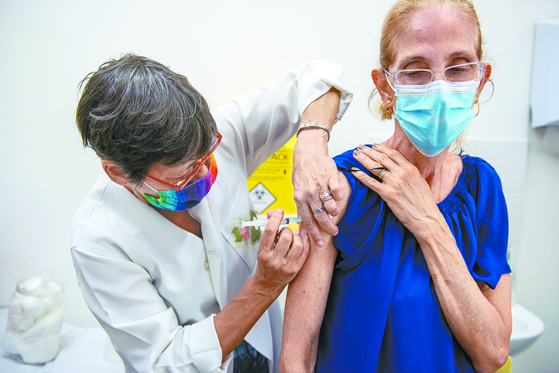
A citizen is getting the AstraZeneca vaccine in Rio de Janeiro, Brazil. Pentapress = Yonhap News
The World Health Organization (WHO) is expected to decide whether to approve emergency use of a novel coronavirus infection (Corona 19) vaccine developed by AstraZeneca and Oxford University as early as this week. In Korea, AstraZeneca vaccination is scheduled to begin at the end of this month.
The WHO Strategic Advisory Group of Experts on Immunization (SAGE), WHO’s expert advisory group, announced on the 10th that the AstraZeneca Corona 19 vaccine can be used by adults over the age of 18 without age restrictions. In addition, it has also suggested that it is more efficient to inoculate at 8-12 weeks intervals when inoculating twice. The standard vaccination interval suggested by the pharmaceutical company is 4~12 weeks, but SAGE said, “The effect is better when the interval between 1 dose and 2 doses is 8-12 weeks.” SAGE concluded that the AstraZeneca vaccine could be given to the elderly over the age of 65, and that it could be used in countries with a widespread COVID-19 mutant virus. The WHO has so far approved emergency use only for vaccines developed by Pfizer-Bioentech.
The decision of the WHO advisory group came amid controversy over the AstraZeneca vaccine, the effectiveness of vaccination for the elderly and the ability to defend against mutant viruses.
The European Medicines Agency (EMA) has issued a recommendation that vaccination is possible regardless of the age of 18 years or older, but European countries have restricted the vaccination of AstraZeneca to the elderly. This is because there are insufficient data from clinical trials to prove the effectiveness of the vaccine to the elderly.
In Germany, France, Austria and Sweden, the vaccination age was under 65, Finland under 70, Poland under 60, and Belgium under 55. The UK is already vaccinating adults over 18 years of age. In addition, a study found that the effect was limited against mutant viruses originating in South Africa, and vaccination was discontinued in South Africa. “I thought urgency first,” said Alejandro Krabioto, who leads SAGE. It means that patients should be prevented from getting worse and dying. There are thousands of people around the world who die of COVID-19 every day. Even if the information is not as complete as you want, you can use it.”
![Graphic image of AstraZeneca vaccine, age restricted country. [자료제공=뉴욕타임스, 외신 종합]](https://i0.wp.com/pds.joins.com/news/component/htmlphoto_mmdata/202102/14/a2b294e1-5ad3-459c-ad9e-65f3ca5776c0.jpg?w=560&ssl=1)
Graphic image of AstraZeneca vaccine, age restricted country. [자료제공=뉴욕타임스, 외신 종합]
Following SAGE’s decision, the WHO will decide whether to approve urgent use of the AstraZeneca vaccine this week. On the 14th, foreign media such as the Guardian and New York Times said, “This decision of the WHO advisory group will open the way for the Covax Facility, a vaccine joint purchase alliance supported by the UN, to supply AstraZeneca vaccines to underdeveloped countries.” . AstraZeneca vaccine has the advantage of being cheaper than Pfizer vaccine and that it can be distributed in a regular refrigerator. AstraZeneca is the main supplier of Kovacs. During the first half of this year, 366 million doses of this vaccine will be delivered to member countries. 1.5 million servings (750,000 servings) will be supplied to Korea from the 24th of this month.
The Ministry of Food and Drug Safety approved the use of the AstraZeneca vaccine for adults over the age of 18 on the 10th. It was allowed to be used by the elderly over the age of 65, but with a clue that “you have to make a careful decision.”
The Korea Centers for Disease Control and Prevention (KCDC) will hold a briefing at 2:10 pm on the 15th and announce plans to implement the corona 19 vaccination in February and March. The Agency for Disease Control and Prevention initially decided to announce the implementation plan on the 16th, but it advanced the schedule by one day. The detailed plan is expected to contain the targets for each vaccine and specific vaccination schedule.
According to the vaccination plan announced last month by the Agency for Disease Control and Prevention, the targets for the first quarter are 830,000, including 50,000 medical staff who treat corona19 patients and 780,000 elderly and workers in nursing hospitals and nursing facilities. As planned, the Pfizer vaccine will be given to medical staff, and the AstraZeneca vaccine will be given to residents and workers in nursing hospitals and nursing facilities.
Reporter Esther [email protected]
